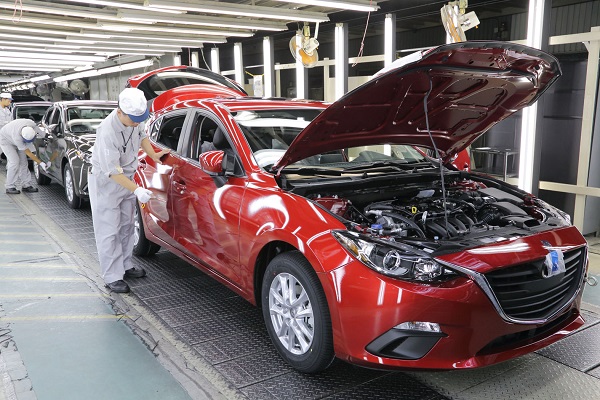After rebounding in 2014, automobile production in Japan dropped 5.1 percent in 2015, according to the latest data from the Japan Automobile Manufacturers Association. The group pinned some of the blame on what it views as excessive taxation on vehicles.
The nations automakers produced 9.28 million units in 2015, with output of passenger cars showing the largest decline, 5.4 percent to 7.83 million units. Truck production fell 3.5 percent and the number of buses dipped 1.4 percent.

Photo: Mazda
Automobile sales in Japan decreased 5.1 percent in 2015. Above, workers at a Mazda factory in Hofu, Japan, assemble Mazda 3 sedans.
Domestic sales for all automobiles fell 9.3 percent to 5.05 million units, with passenger cars down 10.3 percent to 4.22 million units, while trucks fell 4 per cent to 817,235 units. Buses showed double-digit growth of 11.7 percent to 13,387 units.
Automobile exports (including knock-down units) for 2015 increased 2.5 percent to 4.58 million units. Exports to Asia slid 5.5 percent, while those to North America and the Middle East increased by 5.2 percent and 9.5 percent, respectively.
After a one-year turnaround, motorcycle production fell 12.5 percent to 522,329 units as domestic sales dropped by 10.6 percent to 372,696.
Motorcycle exports also fell by double digits, decreasing 10.3 percent to 417,649, mainly because of lower shipments to North America and Europe. Although exports to Asia and the Middle East grew 12.2 percent and 39.4 percent, respectively, those increases were more than offset by drops of 27.2 percent for North America and 2.2 percent for Europe.
Japans car ownership policies remain unsupportive, according to Jama.
There is too much taxes on gasoline and cars, Fumihiko Ike, the associations chairman, said in an article in the January issue of Jamagazine. In addition to insurance, it is a burden for consumers.
Compared to the U.S., costs in Japan can add up to multiple ten-folds, he added.
In December, the Japanese government approved a new, fuel efficiency-based tax scheme for motor vehicles to be levied beginning April 1, 2017.
JAMA finds it regrettable that this decision was taken before fully considering Japans extensive automobile tax structure, particularly in view of the consumption tax increase that is also scheduled to take effect in April 2017, JAMA said in a statement on the new tax policy.